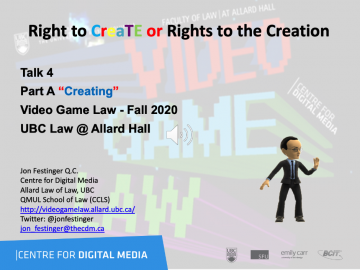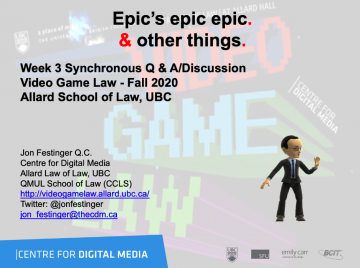The status quo in video game copyright – namely, that the “constituent elements” of video games as systems are copyrightable[1] but that the gamer’s role in supplying the “creative inputs [emphasis added]” for such systems[2] precludes games per se from copyright[3] – may be problematic in the context of some emerging video game genres. In particular, I find that the contemporary copyright analysis seemingly breaks down when applied to a nascent genre of video games popularly referred to as ‘walking simulators.’ Indeed, application of existing copyright law suggests that games belonging to this genre are not the “uncopyrightable systems” that Boyden describes as “containers, not transmissions,”[4] but implies instead that they may be copyrightable per se as artistic expressions, where the player, crucially, returns to a receptive rather than transmissive role.
‘Walking simulators’ refer to an increasingly-popular genre of plot-driven video games where player interactivity is largely discarded in order to privilege the developer’s narrative vision and intended experience. For instance, Andy Chalk, in his glowing review of 2017’s magic realism mystery What Remains of Edith Finch, clarifies that the game offers, “few opportunities to explore off the beaten path, and very limited interactivity. Special movements like climbing and crouching happen automatically when necessary, and you’ll be prompted to interact with the environment where, and how, appropriate. There’s no inventory or choices to be made [emphasis added]”[5]
The genre first gained prominence with the unexpectedly popular free-to-play Source Engine mod Dear Esther (2008),[6] and has arguably entered the mainstream through the successes of critically-acclaimed hits like Gone Home (2013), Everybody’s Gone to the Rapture (2015), Firewatch (2016), and the aforementioned What Remains of Edith Finch (2017).
Given the nature of these games, I think the copyright dilemma becomes clear. As Boyden explains, the Whist Club axiom that games per se are not copyrightable may be justified on the basis that while copyrightable expressions like “music and plays… transmit a protected aesthetic or intellectual experience from author to audience,” video games “merely create the conditions for it [i.e. the experience] to occur [emphasis added].”[7] As such, the distinction that allows games to be excluded from copyright essentially rests on the assumption that games inherently situate the gamer in a performative and creative role. To my mind, walking simulators seem to challenge the validity of this distinction. Given that walking simulators often require the player to do little more than ‘press play’ on elements of the game world (e.g. audio diaries) to progress the story, and offer no space for strategy or meaningful interaction outside of reception of the narrative, the notion that such games merely create the ‘conditions’ for the experience rather than directly transmitting it to the gamer-as-audience seems questionable.
What do you guys think? Do these games, by affording players only the most minimal interactivity choices necessary to achieve the developer’s narrative goals, effectively avoid the Whist Club axiom? Should such games thus be captured by copyright in the same way that music, television, or literature is today?
[1] Bruce Boyden, “Games and Other Uncopyrightable Systems” (2011) 18:2 Geo Mas L Rev at 445 [Boyden]
[2] Ibid at 479
[3] Whist Club v Foster, 42 F 2nd 782 (SDNY 1929)
[4] Boyden at 442
[5] Andy Chalk, “What Remains of Edith Finch Review” (2017) PC Gamer: https://www.pcgamer.com/what-remains-of-edith-finch-review/
[6] Meg Eden, “The History of Walking Simulators” (2019) MAGFest: https://super.magfest.org/mages-blog/the-history-of-walking-simulators
[7] Boyden at 476





 Communications Law
Communications Law